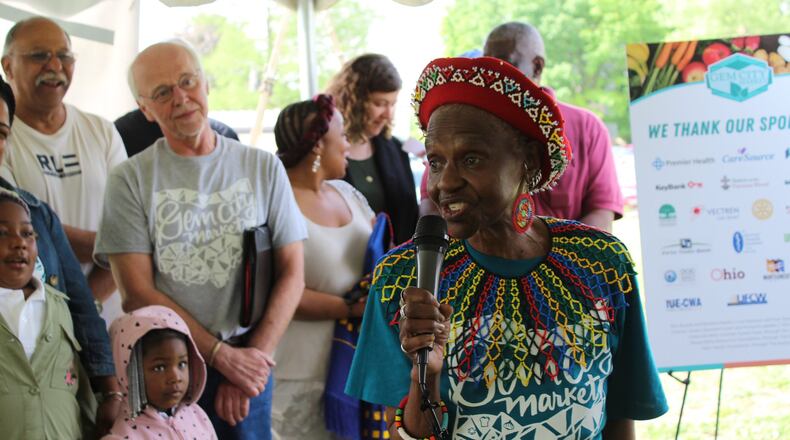MORE: Mountain bike park near UD Arena may get rolling
The market will be constructed on about 1.2 acres of land that includes an empty field on the 400 block of Salem and the abandoned Ken McCallister Inc. art supply property on the 300 block.
A capital campaign officially kicked off this week to raise the money to build the store, but already more than one-third of the $4.2 million needed for the project has been committed.
The hope is to open the market by the end of 2019. A campaign to sell at least 2,000 memberships before its doors open is approaching the halfway mark, with more than 920 sold.
“The Gem City Market will be a vibrant, community-centered, full-service grocery store that brings access to high-quality and affordable produce to the 12 neighborhoods that compromise our trade area in northwest and west Dayton,” said Lela Klein, executive director of the Greater Dayton Union Co-op Initiative, which is leading the market project.
RELATED: Proposed grocery co-op has brisk sales of shares
Dozens of supporters and community members gathered at 400 Salem Ave. on Wednesday to officially unveil the future site of the Gem City Market.
The market will employ local residents and will offer fresh produce, meat, goods and other high-quality staple foods.
The market will be a unique draw because it will sell specialty, local and organic products, supporters said.
The market has always been targeted for the lower part of the Salem Avenue corridor. One of the areas previously considered was the 100 block of Salem Avenue.
But the 1.2 acres is a great fit for the market, which is expected to be about 15,000 square feet and may have a coffee shop, cooking classes and other amenities. A feasibility study will determine whether to re-purpose or demolish the art supply structure, which is about 9,000 square feet in size.
The market project is expensive, but hopefully local residents will step up and help raise the remaining money to help address the food crisis, said Tony Hall, founder of the Hall Hunger Initiative.
The campaign has raised $1.75 million toward its capital goal. The market may try to take on $1 million in debt or pursue that amount in tax credits to help with capital costs, officials said.
Unlike most grocery stores, the Gem City Market will be owned, operated and managed by the community, including its workers and customers, Hall said.
The market is going into an area that is one of the largest food deserts in Ohio and may be one of the largest in the nation, he said.
Studies have found Dayton to be one of the hungriest communities in the nation, and also it is one of the worst in the country for food hardship for households with children, Hall said.
“That’s not right, that’s not acceptable,” he said. “We’ve got to do something about it.”
Mama Nozipo Glenn lives a few blocks from the market site. Mama Nozipo, who is honorary chair of the market, said she has to catch multiple buses to get to the grocery store that has quality food she can afford, like the Meijer at Stroop Road and Wilmington Avenue.
She said a corner store sells a single rotten banana for the same price she can buy a bunch of fresh ones at stores that unfortunately are “far, far away.”
She said at times she has to go to the store twice in one day because she can’t carry everything she needs.
She said Gem City Market will be incredibly convenient and will create a lasting legacy that will impact generations to come.
“We will take care of it because we own it, its ours, because it belongs to us,” she said. “It will be clean, it will be healthy, there will be no thievery because it belongs to us.”
Market members get special prices and deals on some products, similar to rewards members at grocery stores.
TRENDING: DPS approves $575K in raises, ousts principal despite public outcry
Members also can vote or run for a seat on the market’s board of directors, get to participate in annual meetings to make decisions about the store and will share in the percentage of profit not reinvested in the store, the market said.
Memberships cost $100. But some people will qualify for a subsidized membership. There are payment plans to help spread out the membership fee.
About the Author

